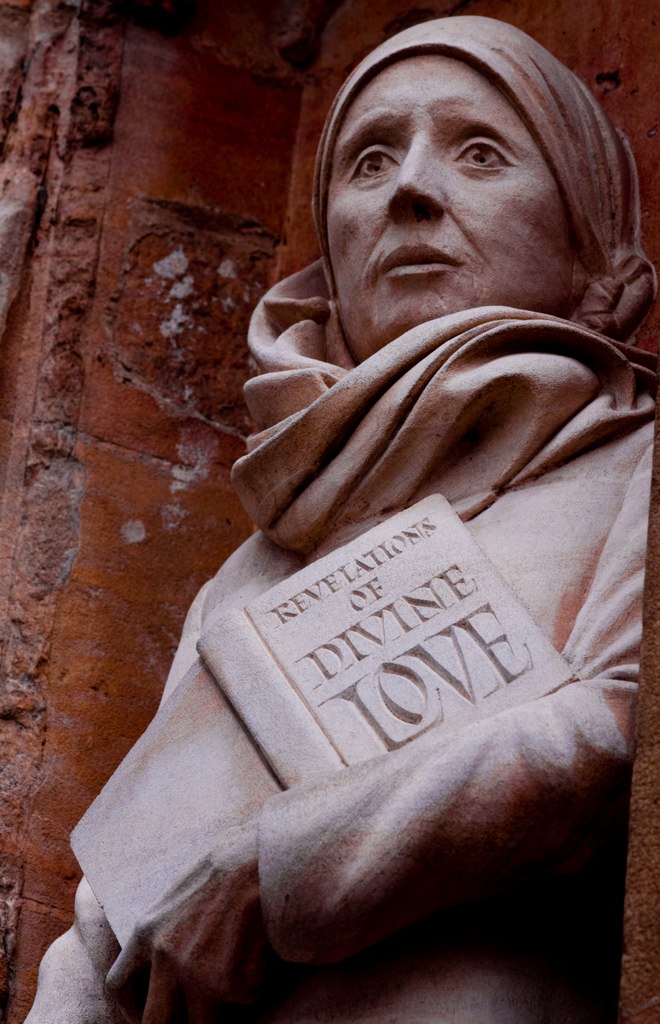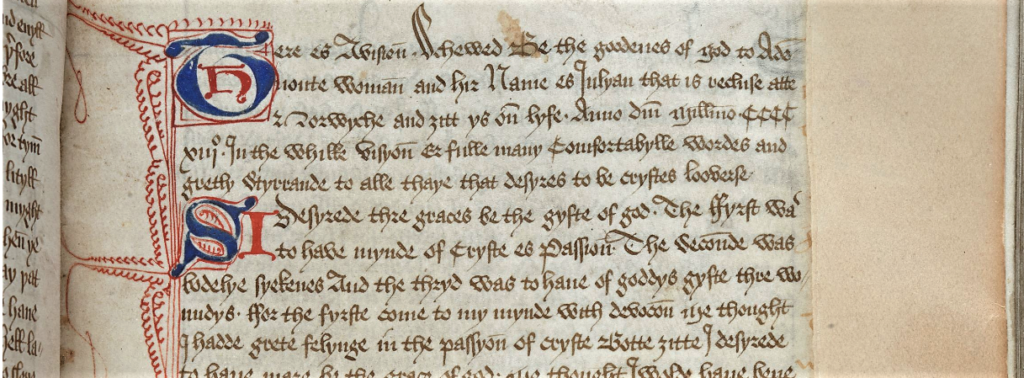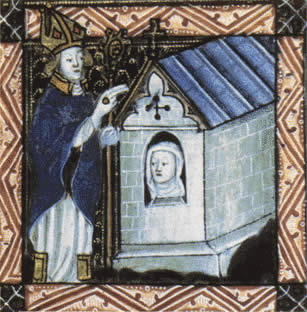by Paul Harris *

(CC BY-SA 2.)
The Black Death, a viral pandemic in England and Europe in the 1300’s, killed 50 million people, 60 percent of the population, and it is regarded as the greatest catastrophe in recorded history. It destroyed a higher proportion of the population than any other single historical event. The disease was carried by fleas and rats, and passed on from person to person.This devastating pandemic wiped out many towns, cities, hospitals and monasteries. Individuals usually only lived 23 days between contact and death. The plague was particularly disastrous in 1346-1353, but returned time and time again through the 1300’s.
We only know a little about Julian’s early life in this dangerous environment. She was born in Norwich in 1342, and was probably schooled in a Benedictine monastery. In 1373 she contacted the virus at 31 years of age, and came close to death. A parish priest was called to give her the last rites, and it is recorded that her mother closed her eyelids in anticipation of her imminent death. In this near death state she experienced a series of 16 visions gazing at a crucifix held up by the priest. After her illness she subsequently wrote a short text about her unexpected recovery. And many years later Julian wrote a longer text outlining these visions and spiritual revelations during her illness, entitled Revelations of Divine Love. It is the first book in the English language known to have been written by a women.
THE WARMTH, CLOSENESS, AND TENDERNESS OF GOD
Why does Julian appeal to us? One reason is that in her writings she brings refreshing optimism, and new insights into the nature of God, particularly the warmth, closeness, and tenderness of God. More importantly, Julian is one of the few medieval writers who says it is absolutely impossible that God could ever be angry at us, for as she says, “anger and friendship are two opposites”. God, says Julian, is loving, gentle and kind, which is the opposite of angry. She states, “For I saw full well that whenever our Lord appears, peace reigns, and anger has no place. For I saw no anger in God, in short or in long term” She goes on to say that God’s love is compassionate and never wrathful.
THOMAS MERTON ON JULIAN
So inspiring are Julian’s insights, that the Trappist monk Thomas Merton, made this astonishing statement about her:
Says Merton: “Julian is without doubt one of the most wonderful of all Christian voices. and she gets greater and greater in my eyes as I grow older. In the old days I used to be crazy about St John of the Cross, but I would not exchange him for Julian if you gave me the world, and the Indies, and all the Spanish mystics rolled up in one bundle. I think that Julian of Norwich is with Newman, the greatest English theologian”.

A MESSAGE OF JOYFUL OPTIMISM AND HOPE
In Julian;s 14th century world of unrest and the Black Death, a world not unlike our own current state, she speaks of a God of tenderness. a God of compassion and love. As the Dominican priest Conrad Pepler once said, “we need her message of joyful optimism and hope, when we are in danger of being crushed under a lethal pessimism”. God’s love rings down through the centuries in Julian’s revelations when the Lord says to her, “But all things shall shall be well, and all manner of things shall be well”. Her revelations encompass a wide range of topics, and portray an unquenchable optimism regarding God’s power to bring good out of evil.”
JOHN MAIN AND JULIAN
In one of her revelations Julian says, “For in the human soul is God’s true dwelling,” and adds, “utterly at home he lives in us forever”. Again she says, “God is the still point at my centre”. John Main picked up on this saying of Julian’s, and in one of his talks says, “Meditation is a daily pilgrimage to our own centre”.
Once in a time of prayer, Julian heard these words of the Lord, “I am the foundation of your praying”. These words were a great consolation to her in her practice of inner prayer. Is it any wonder that John Main asked to hear readings by Julian in the last days of his life?
ALL BELIEVING PRAYER IS PRECIOUS TO ME
As one might expect, God speaks to Julian about desolation and helplessness in our daily life of prayer and the need for perseverance. She says: “our prayer brings great joy and gladness to our Lord. He wants it and awaits it. So He says this: “Pray inwardly, even though you find no joy in it. For it does good, though you feel nothing, see nothing, yes, even though you think you cannot pray. For when you are dry and empty, sick and weak, your prayer pleases me, though there is not enough to please you. All believing prayer is precious to me”. No wonder John main loved Julian, studied her revelations, and chose to listen to her writings of optimism and hope as he approached death. Two of Julian’s more famous quotations are “Utterly at home, he lives in us forever”, and: “Our faith is to receive the divine ground of our being”.
JULIAN BECOMES AN ANCHORITE IN NORWICH

In approximately 1394 Julian became an anchoress in Norwich, England, enclosed in a small cell attached to the church now known as the Church of St Julian. This small anchorage of about 100 square feet had a window looking into the church, as well as a window looking out to the street. The window to the Church would allow her to receive the daily Eucharist at the Church Mass. The window to the street would allow daily spiritual counselling to visitors, and donations of food and heat for her daily needs. She would also have had a small garden. In her anchorage Julian wrote a book on contemplative prayer, as well as other spiritual writings. She was still alive in her anchorage in 1429, and lived until she was 87. Visitors visit the location of her anchorage in Norwich from around the world.
Julian had lived through her time of pandemic, taught about perseverance in prayer, fought the good fight, and is a saint for our times.
(Paul Harris is a former Canadian National Coordinator of Christian Meditation)



